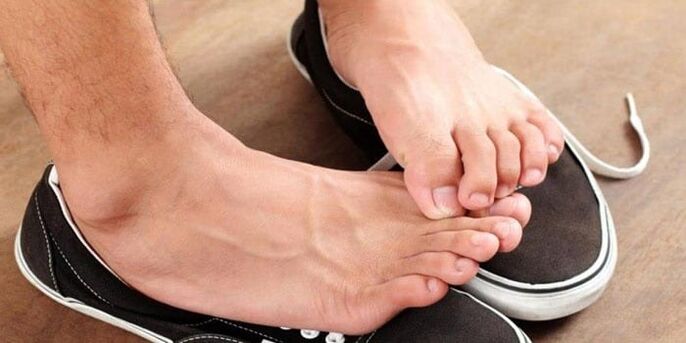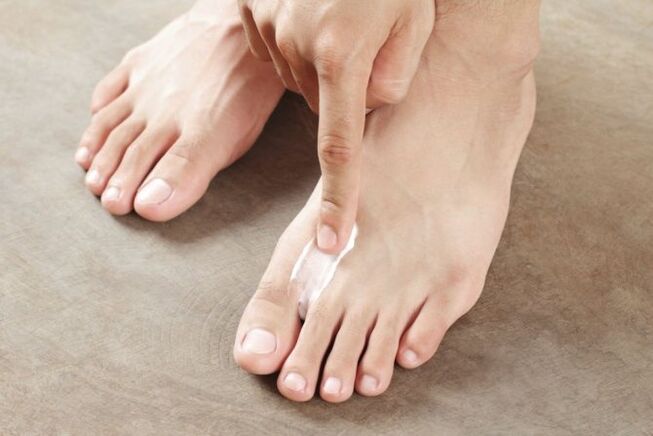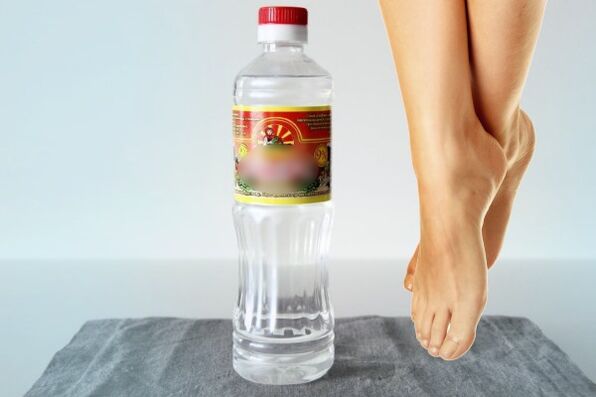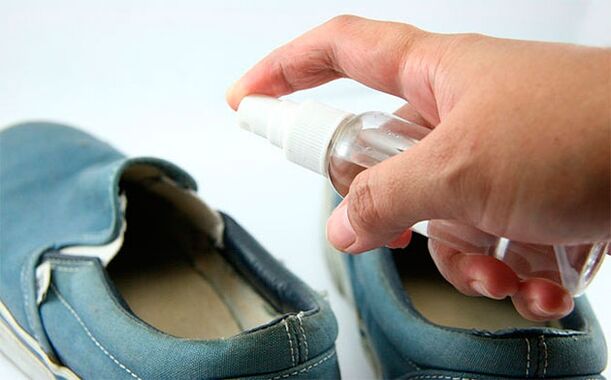Fungal pathology is a common disease among all age categories of the population. It is necessary to treat the fungus on the legs between the toes because of the high risk of infecting others, including members of your family, with the infection. Mycosis is treated easily if its symptoms are recognized at the initial stage. In chronic cases, it may take from several months to a year to get rid of the disease.

Etiology
Fungal spores can be found on clothes, shoes, and household items for several years.
The appearance of a fungus on the legs is a sign of a failure in the protective functions of the body. Avitaminosis, exacerbation of chronic infections, seasonal viral diseases - all this can lead to a decline in immunity, and then to a fungal disease. A healthy body will not allow pathogenic microbes to multiply. Risk factors:
- the presence of one of the diseases:
- pathology of the gastrointestinal tract;
- tuberculosis;
- ENT infections;
- diabetes;
- HIV.
- changes in metabolism;
- hormonal surges:
- adolescence puberty;
- pregnancy;
- menopause;
- menopause.
- wearing shoes that do not fit;
- the presence of corns, abrasions on the foot;
- putting on someone else's shoes;
- use of poorly disinfected pedicure tools;
- walking barefoot in saunas, baths, pool complexes;
- excessive sweating;
- bad habits:
- alcoholism;
- smoking.
- the use of products with mold;
- hereditary predisposition to fungal infections (violation of the acid-base balance in the skin).
Signs of the disease
Signs of fungus between toes:
- itching between toes;
- peeling and peeling skin between fingers;
- blisters appear on the skin between the fingers, which burst and form oozing erosion;
- on the feet, the skin thickens, cracks (often this happens under the little finger);
- the nail on the big toe looks dull, changes color and structure;
- the occurrence of a rash, redness of the skin of the feet;
- bad foot odor.
Diagnostic methods
Just finding the disease is not enough. We need a detailed diagnosis that will help identify a specific strain of the fungus and its sensitivity to antifungal drugs. For this, the dermatologist, after examination, directs the patient to scraping from the affected areas of the feet. As a result of these studies, it is possible to prescribe a treatment that is effective in a particular case.
You can recognize the fungus at home. Potassium permanganate will help. If you dip your feet into a weak solution of potassium permanganate, healthy skin will turn pink, while diseased areas will remain white.

What to treat?
To cure interdigital fungus on the legs, you need to be patient - therapy takes from a month to a year in some cases. Treatment of mycosis includes the use of fungicidal agents of local (to relieve symptoms) and systemic action, antibacterial and healing drugs and vitamin complexes. It is important to treat the disease with a full course of medication. After the symptoms disappear, it is important to continue using the medicines for another 10 days.
Medications
Medicines of synthetic origin against foot fungus can be divided into local and systemic. Local are aimed at relieving symptoms and treating an incipient fungal infection. While the systemic use of antimycotic agents has a complex effect on the body. Such drugs are very toxic, so their use is contraindicated in children, pregnant women, during lactation.
Form of release of topical preparations:
- ointment;
- cream;
- spray;
- nail polish.
Local remedies are good for fungus:
- Castellani liquid;
- chlornitrophenol;
- cationic antiseptic;
- ammonia;
- potassium permanganate;
- iodine;
- aluminum acetate solution;
- solution of iodine in an aqueous solution of potassium iodide.
Active substances that systemically affect the fungus are available in the form of tablets and solutions for intravenous administration.
Treatment with folk remedies
You can cure the fungus between the toes with the help of traditional medicine recipes. However, the use of such methods should be agreed with the attending physician. It is also important to make sure that there are no allergic reactions of the body to natural medicinal components. To check this, you need to apply a small amount to the inner bend of the elbow and wait a few hours. If there is no redness or rash at the site, a folk remedy for the fungus between the toes is suitable for use.

Vinegar for fungus
Ordinary table vinegar (wine or apple cider vinegar are best) has an acidic environment that is detrimental to a fungal infection. You can quickly cure the fungus on the big toe by applying a vinegar compress to it daily. It is advisable to wrap the legs with polyethylene and leave for 5 minutes. After that, the feet are washed well with running water and an antifungal drug is applied.
Another recipe using vinegar:
- Pour a vial of glycerin into a half-liter jar.
- Fill the jar with 70% vinegar up to the neck and mix well.
- Soak a swab in the solution and apply between the fingers every day.
Sea salt for toe fungus
The most effective treatment with folk remedies is possible with the use of sea salt. If it is not possible to get sea salt, then ordinary table salt can also be used. To prepare a solution for foot baths, add 5 tablespoons of salt to hot water. Do foot baths several times a day until a steady recovery from the fungus on the toe.
How does soda help?
Violation of the acid-base balance leads to the fact that a fungus appears between the fingers. Soda restores skin balance and actively fights against foot fungus. Recipes using soda:
- Foot baths with soda can be prepared if you add 2 tbsp to 2 liters of water with a temperature of 40 degrees. l. soda.
- Soda-based fungus paste is prepared from 2 tablespoons of the component, a spoonful of water and a few drops of lemon juice. Mix all ingredients. A chemical reaction will follow with the release of gas bubbles. After they disappear, you can smear the paste on the damaged areas of the skin.
Bow use
Preparing a cure for a fungal infection from ordinary onions is very simple. You can chop the head of the onion into gruel and apply this remedy to the affected areas. It is possible to add garlic gruel (1: 1). It is also useful to squeeze the onion juice and use a cotton swab to apply the juice to flaky feet. Apply daily.

Hygiene and care for feet and shoes
For the period while the fungus on the toes is being treated, it is important for the patient to allocate individual underwear, socks, hygiene items - pumice stone, scissors. All footwear must be thoroughly washed and dried. If possible, shoes should be treated with a 1% water-methanol solution of formaldehyde - fungi die in it within 15 minutes.It is necessary to carry out hygiene procedures for the feet at least 2 times a day, keep the shoes dry and clean, and avoid blisters and abrasions on the legs. Washing clothes is best done at the highest permitted temperatures.
Surgical intervention
If the fungal sore does not disappear after the use of local and systemic medicines, and folk remedies do not have the desired effect, an operation against the fungus on the legs is possible. The procedure is performed in a medical facility under local anesthesia using a local anesthetic. Damaged skin is cut off with a scalpel, the place is treated with antiseptics. This method guarantees complete recovery.
How to treat a child?
Fungus in a child is less common than in an adult. However, due to non-compliance with hygiene rules, infection of children with a fungus is possible. The fungus occurs in children mainly on the thumb and little finger due to their frequent injury. Treatment involves the use of local preparations - ointments and creams.

Features in pregnant women
A fungus between the toes during pregnancy is a common occurrence due to a decrease in immunity in a woman in position. The disease is not dangerous for the fetus in the womb, but it is possible and necessary to treat the disease during pregnancy so as not to infect the already born baby later. The choice of drug for pregnant women should be in favor of the most non-toxic and easy to use drug with a short course of treatment. Perhaps folk treatment of a fungal disease. Systemic therapy is contraindicated.
Prevention methods
To be sure that the fungal disease does not penetrate the body, it is necessary to increase the protective functions of the body in every possible way - to harden, eat well, give up bad habits. It is important to observe the rules of personal hygiene: washing hands after visiting public places, wearing changeable shoes in pools and baths, washing feet daily. You cannot wear someone else's shoes and allow other people to wear their own. When buying shoes and clothes, choose items made from natural fabrics.
















